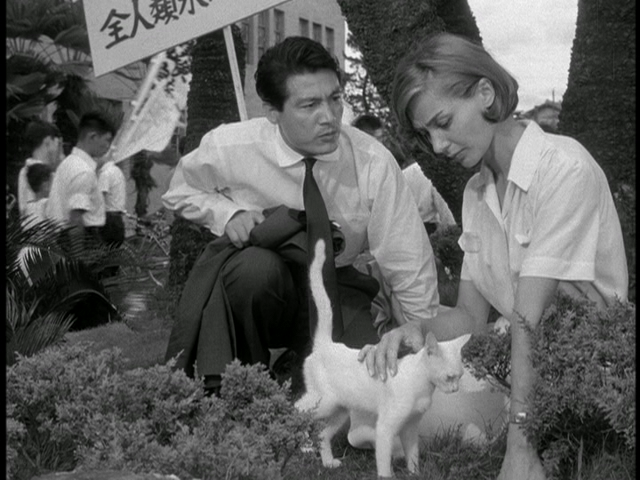
The universal themes of love, loss, and memory transcend dimension in Alain Resnais’ tour de force masterpiece Hiroshima Mon Amour (1959). Thrust together by need and desire Elle a French actress and Lui a Japanese architect share a one night stand in Hiroshima and delve into a didactic on their very different, but also very similar world experiences. Resnais creates a hybrid film overlapping between the documentary, unrequited love-story, and even pushing the envelope through the metaphysical aspects of Hiroshima Mon Amour.
There are overwhelming references to rebirth and perhaps even reincarnation within Resnais’ film. The opening image that the credit runs over is a still of a plant growing out of the sand. During the opening documentary montage of Elle and Lui’s didactic on the catastrophe of the atomic bomb, Resnais returns to that same image when Elle alludes to “new vegetation rises from the sands”. This time we see beside the plant a cigarette box with the words “Peace” printed on it.
The bond that forms between Lui and Elle also alludes to something rising out of the ashes. From the moment that Elle sees Lui’s hand lying in bed the morning after their tryst, she immediately ties the connection to her first love 15 years back in WWII. Resnais conveys this with a jump cut insert as if we the spectator where in Elle’s mind pulling up the memory with her. Later when Elle concedes to give in to Lui’s desire to be with her again, she unravels little by little the significance of her first love with a Bavarian soldier during the occupation of France in a quiet little city: Nevers. She begins to project the soldier onto Lui recounting the experience by saying things like “You are dead”. Lui encourages her to tell her whole story by reinforcing the illusion and asking “Am I dead?” in order to keep his place in Elle’s non-linear recounting of events.
By the end of their revelation Elle decides it is best to part ways in their conversation she admits there is very little likelihood that they will ever see each other again unless there is “another war”. The significance of the reference to war and the catastrophic losses that brought them together is in a way another reference to the theme of rebirth. During the film’s opening montage when Lui and Elle are exchanging counterpoints while making love Elle says over and over again “you’re destroying me you’re good for me”. Her paradoxal statement epitomizes the consequences of forbidden love and sweetness of it in her own life. Her liaison with both the Bavarian and the Japanese man are liaisons with the international “other”. Japan and Germany were allies to each other during WWII and in the post-war world an inter-racial union with either would be considered risqué.
Contracted to do a film on the atomic bomb, Resnais instead chose to show the catastrophic aftermath of the experience of the bomb through the individual. His non-linear narrative conveys a very tactile experience for the spectator through the inter-cutting of inserts that correspond to Elle’s description of the abrasive cellar she endured her madness in or the blurred memories of her affair with the Bavarian soldier. The multi-valent layers of narrative and human emotion keeps Hiroshima Mon Amour in the circle of one of my favorite films of all time.
No comments:
Post a Comment